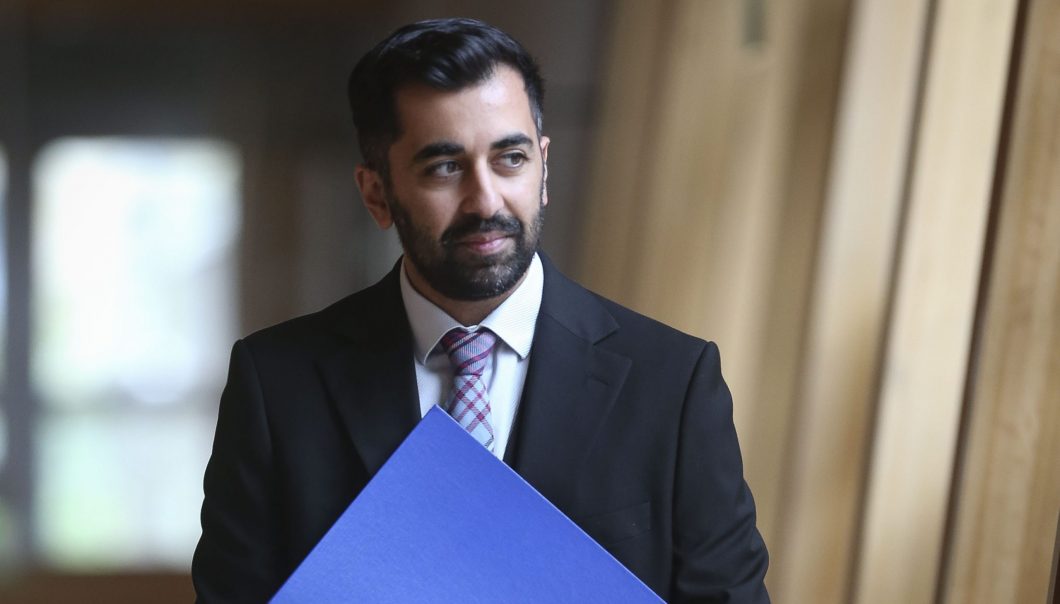The First Minister thought the trans issue would pave the road to Scottish independence. Instead, it showed her the door.
Scotland’s New Blasphemy Law
The Scottish government’s proposed “Hate Crime and Public Order Bill,” first introduced in April 2020, was so overreaching that it managed to inspire the creation of the “Free to Disagree” grassroots campaign, uniting even the Catholic Church and the National Secular Society in opposition. The Scottish National Party (SNP) led government sneaked a maximum seven-year prison sentence for “stirring up hatred” into a bill repealing a 200-year-old dormant blasphemy law. Such a law would have a chilling effect on free speech and expression, since, as the Scottish Police Federation explained, it would force officers to “police what people think or feel.”
Yet, Scotland’s Justice Secretary, Humza Yousaf, insisted that policing expression — be it in public, online, or even at private dinner parties — is necessary in order to stamp out “hate.” In 2018, the government launched a joint campaign with the Scottish police, urging people to report any hate crimes and non-criminal “incidents” they might have witnessed. It was concern for the rise in so-called hate crimes that prompted the SNP to commission an independent review into the matter, and subsequently conclude that a “one stop shop” for hate crime would be best.
In January 2017, the Scottish government commissioned a report by Lord Bracadale, a retired senior judge, tasking him to examine all of the country’s existing hate crime legislation to ensure that it was “fit for purpose in the 21st century.” However, instead of noting that it is not the role of government to police the human heart, as would have been sensible, Bracadale recommended that age, and possibly gender (by which he meant biological sex), were included in the list of protected groups. Given that the Scottish government, besotted with transgender ideology, is unable to define what a woman is, there is little reason to be hopeful that more provisions will bring greater protection.
As introduced, there are multiple parts to the bill, two of which are: “aggravation of offences by prejudice,” which are pre-existing offenses such as assault or destruction of property; and new “offences relating to stirring up hatred,” such as expressing bigoted or offensive opinions. Adding the status of “hate” to pre-existing crimes is superfluous since most judges already consider crimes aggravated by prejudice as more serious and reflect that view in their sentencing.
While it is true that freedom of speech is not freedom from consequence and that the confrontation of malignant prejudices should be addressed, this should be done by community leaders (i.e. teachers, religious leaders, business owners etc.,) and not by a police state.
For instance, Bracadale begins his review by citing, as proof of the need for “hate crime” laws, the so-called “Punish a Muslim” campaign, created by an anonymous author and “offering point-based rewards for those who attack and abuse Muslims, including ‘verbal abuse,’ pulling head-scarves off, beating up a Muslim, ’butchering’ a Muslim and burning a mosque.” But again, the perpetrator in this particular incident has already committed a crime under common law, starting at breach of peace and escalating to incitement of violence.
Since the bill’s drafters are presumably aware of this redundancy, one can only presume that they are attaching the status of “hate crime” to pre-existing crimes for political reasons. Perhaps to make the new offense of “stirring up hatred” seem less intrusive. Frustratingly, by the end of the bill we are still no closer to an objective definition of “hatred,” except that it is something that a “victim,” i.e. a member of a protected group, finds to be offensive.
What will this do to the famous Scottish sense of humor? John Cleese, the comedian behind Monty Python and Fawlty Towers, has called the law “disastrous.” Rowan Atkinson, the comedian who came up with Blackadder and Mr. Bean, and another 20 or so artists, authors, and arts campaigners also expressed their opposition to the bill as an assault on free speech.
In clearing its first parliamentary hurdle, Yousaf said he had spent time “carefully listening” to the concerns of critics, especially their worry that his bill “could be used to prosecute legitimate acts of expression”. He maintained that “freedom of expression is not an absolute right,” but, as a compromise, placed new emphasis on hateful “intent,” though, again, this is based primarily on the accuser’s perception. In any case, Yousaf refused to remove the word “insulting,” which, for some reason, applies only to race, whereas with gender identity or religion, offenses must rise to the level of “abusive” or “threatening”.
Yousaf also agreed to remove the provision for punishing those who “have in their possession threatening, abusive or insulting material with a view to communicating the material to another person,” which would have included book shops and libraries, and made a similar exemption for theater performances. He told parliament that he was willing to make these changes since “it is important to put the concerns over the question of the operation of the new offences beyond doubt.” But are they?
Disappointingly, some of the bill’s critics, especially those inside the Scottish parliament, took a mild approach. A dissenting SNP backbencher, Richard Lyle, said that though he disagreed with some of the bill’s content, “there is no doubt in my mind that the aims of the bill are laudable.” Labour MSP Rhoda Grant also called for “further improvements” in order to ensure that the bill does not “criminalize legitimate views.” Adam Tomkins, a Conservative MSP, complained that the bill did not strike the right “balance” of protecting free speech and punishing crimes motivated by hatred.
But just who do Humza Yousaf, or any of these elected officials, think they are to decide what constitutes a “legitimate” view? Who are they to outlaw any thought or opinion? And, again, since there are already laws that prevent abuse and sentencing to reflect the seriousness of crimes aggravated by bigotry, why is a separate category of “hate crime” even necessary? Might they try explaining that to the public? Apparently not. The amended bill moved to its second stage in February 2021 after MSPs backed its “general principles” by 91 votes to 29. (Next, there will be a debate and a vote, then it is likely to become law.) At this writing, requests by opposition politicians for robust free speech provisions appear to have been all but abandoned. In February 2021 Yousaf announced on Twitter that, having spoken to opposition members, “we have all agreed not to move our amendments in relation to *Freedom of Expression (Hate Crime),” but will try come up with something more general and inoffensive.
While it is true that freedom of speech is not freedom from consequence and that the confrontation of malignant prejudices should be addressed, this should be done by community leaders (i.e. teachers, religious leaders, business owners etc.,) and not by a police state. The political justification for the bill is that preventing “hate” requires preventing certain kinds of speech, but what the drafters really believe is that preventing speech will somehow prevent hate. It won’t. Thus, this is not a “laudable” approach, commended by its “good intentions,” it is sinister nonsense.
Even if all citizens agreed on what constitutes a definition of “hate” — which they don’t — we know that laws do not control the human heart. If, in asking for the bill to be toned down rather than scrapped entirely, this is the best defense of freedom of speech politicians can muster, then Scotland’s future looks bleak.
Part of the problem is Scotland’s monolithic political culture, which, since devolution in 1999 has seen the mobilization of the Nationalist agenda in every sphere of public life from education to the media. The Scottish National Party, which has held a majority in Scotland since 2011, seeks two things: independence from England and a distinct political legacy. Unfortunately, this political legacy is that Scotland is turning out to be “one of the most over-governed, bureaucratized countries in the Western world,” as the Scottish journalist Andrew Neil has put it. The ideology of the SNP might accurately be described as aspiring Eurocommunist or more bluntly still controlling and clueless. Such descriptions are rather neatly symbolized by the First Minister Nicola Sturgeon’s recent decision to publish a book of her own speeches — “given between November 2014, when she took office, and February 2020, after Scotland’s exit from the European Union,” according to the publicity note — and using a Scottish publisher backed by taxpayer money. The book is entitled Women Hold Up Half the Sky, a quote from the 20th century’s murderous communist dictator, Mao Zedong.
Aside from such rhetoric, the SNP’s record on domestic issues is one of embarrassing stagnation. The education attainment gap is ever widening, with only 13 percent of school graduates from deprived areas going on to college (compared to 20 percent in England). Scotland has the worst number of drugs deaths in Europe by a considerable margin and in some parts of the country, such as the East End of Glasgow, the male life expectancy is lower than Mongolia.
Many of these problems are social and cultural. But instead of encouraging regeneration by fostering local initiatives, funding social mobility and literacy initiatives, and giving communities space to get back on their feet, the government has taken it upon itself to micromanage private and family life. Take, for instance, the Offensive Behavior at Football Act, whichwas passed by a SNP majority government in 2011. Packaged as a crackdown on sectarianism, the law treated football fans as second class citizens, depriving them of freedom of speech when, as with the Hate Crime and Public Order Act, there were already laws in place to prevent violence and disorderly behavior. The law was repealed by the Scottish parliament in 2018.
Or take the sinister Children and Young People (Scotland) Act 2014, also known as the “named person scheme,” whereby every child under the age of 18 would have a government appointed adult to oversee their wellbeing. This law was struck down in July 2016, after the Supreme Court decided the law’s “unquestionably legitimate and benign” intentions did not alter the fact that it contravened the European Convention on Human Rights. Such a gross interference in family life has been resuscitated in subtler forms, as with the Scottish government’s funding and oversight in the policy of third party organizations such as LGBT Youth Scotland, which trains teachers in their thousands to tell children as young as five that they might be in the wrong body, and to keep parents in the dark if their child wishes to change genders.
It is amazing to think this is the same country that, during the Enlightenment, led the rest of the world by the example of great thinkers and innovators such as John Stuart Mill, David Hume, Adam Smith, Robert Burns, James Watt, and James Hutton to name but a few. During the Enlightenment, the formerly crushing moral orthodoxy of the established church backed off, allowing for unprecedented flourishing and freedom. But this freedom has been confiscated. Today, Scotland’s new established religion — the Church of Equality, Diversity, and Inclusion — is indistinguishable from government which it uses as the arm of enforcement. It is fittingly ironic, then, that the same bill that would formally abolish the Nineteenth Century offence of blasphemy, would formally institute a new one, “fit for purpose in the 21st century.”



